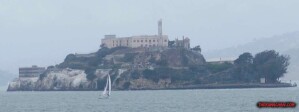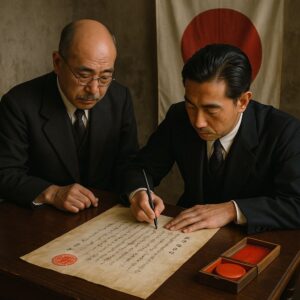History often reminds us that the same day can hold multiple meanings depending on where you stand. August 14 is one such date, etched into the memory of two very different nations for two very different reasons. In the United States, it marks the signing of the Social Security Act in 1935—a cornerstone of the …
Category: Events
Youth, Loss, and Leadership: A Date Where Generations Collide
History is full of dates that feel like crossroads, moments where the themes of life, death, and the shifting of generations meet in unexpected ways. August 12 is one such day—a day where the United Nations celebrates International Youth Day, honoring the promise, potential, and resilience of young people around the world. Yet, in a …
Alcatraz Receives Its First Federal Prisoners: The Rock, Capone, and the World at War
There are certain dates in history when events, separated by oceans and circumstances, become strangely intertwined. August 11 is one of those days. In 1934, the infamous Alcatraz Federal Penitentiary welcomed its first wave of inmates, among them some of the most dangerous and high-profile criminals in America—including the legendary gangster Al Capone. The Rock, …
The Day Japan Offered Conditional Surrender: A Turning Point in World History
The world in August 1945 was exhausted, battered, and holding its breath. For six years, the most destructive war humanity had ever seen had consumed cities, toppled empires, and stolen tens of millions of lives. Europe lay in ruins, its cities scarred with craters and charred buildings, its people worn thin from years of rationing …
Shadows in the Ash: Nagasaki and the Final Blow
On the morning of August 9, 1945, just three days after the devastation of Hiroshima, the Japanese city of Nagasaki found itself at the heart of the most destructive chapter of human warfare. At precisely 11:02 AM, a massive B-29 Superfortress bomber known as Bockscar released a second atomic bomb—nicknamed “Fat Man”—over the city. Within …
The Soviet Blitzkrieg That Broke the Rising Sun
The world was already screaming. Hiroshima had just been vaporized — a hundred thousand lives seared into shadows on concrete — and America was high off the smell of uranium and divine authority. People in Tokyo were twitching, waiting for the next flash of Judgment Day. But somewhere in Moscow, under Stalin’s glassy gaze and …
Shadows of Tomorrow: Nagasaki’s Silence and the Birth of a New World Order
The morning of August 7, 1945, dawned in the shadow of a shattered world. In Japan, the smoldering ruins of Hiroshima still burned from the previous day’s unprecedented horror. Across the Pacific, in the chamber of the United States Senate, something very different was happening—something that, in stark contrast to the destruction unfolding across the …
Hiroshima’s First Dawn of Destruction
The morning of August 6, 1945, unfolded over Hiroshima like any other humid summer day. The city stirred awake beneath a clear sky, with people going about their routines—workers heading to their posts, children preparing for school, shopkeepers unlocking their doors. War-weary but functioning, Hiroshima remained one of the few cities untouched by the relentless …
Behind the Bars That Shook the World
In the crisp chill of a winter morning in South Africa, August 5, 1962, the wheels of a police vehicle hummed down a quiet road near Howick in Natal. Inside sat a tall, dignified man wearing a chauffeur’s cap, assuming the role of a humble driver. But this was no ordinary man, and this was …
When the Empire Chose War: Britain’s Fateful Step into World War I
August 4, 1914, is a date that still echoes with the weight of a world forever changed. On that day, Great Britain officially declared war on Germany, following the latter’s invasion of neutral Belgium. It was a moment that would mark the beginning of Britain’s deep and harrowing entanglement in what would become known as …
How Britain’s First Electric Traffic Lights Transformed Urban Life
The history of a city is often told through its architecture, wars, and politics—but sometimes, its most transformative moments appear in the smallest of innovations. On August 3, 1926, the bustling streets of London bore witness to a curious sight that would go on to change the rhythm of modern life: the installation of Britain’s …
The Day Iraq Invaded Kuwait and the Gulf Caught Fire
August 2, 1990, began like many blistering summer days in the Middle East—dry, cloudless, and heavy with heat. But by the time the sun set over the Arabian Peninsula, the world had changed. In the dark early hours of that day, Iraqi tanks rolled across the Kuwaiti border in a swift and brutal invasion ordered …
Empires in Turmoil, Chains Broken: The Twin Shockwaves of August 1
History doesn’t always announce itself with a thunderclap, but August 1, 1834, and August 1, 1914, were days when the world felt two very different yet equally monumental shifts. One marked the end of institutionalized slavery in much of the British Empire, a culmination of moral reckoning and decades of fierce activism. The other marked …
The Day the World Got Its Voice
When Alexander Graham Bell received U.S. Patent No. 174,465 on July 31, 1876, he couldn’t have fully anticipated the extent to which his invention would change the world. What began as a rudimentary device capable of transmitting the human voice over a wire would evolve into one of the most transformative technologies in human history. …
The Day America Promised to Care for Its Own
It was a sweltering July afternoon in Independence, Missouri, when a president stood shoulder to shoulder with a man who once held his job, both of them representing two very different chapters of American history. The year was 1965, and the moment was far more than ceremonial—it was a reckoning. On July 30th, President Lyndon …
The Man Who Forged the Fasces: The Rise, Rule, and Ruin of Benito Mussolini
On July 29, 1883, in a humble home in the small town of Predappio in northern Italy, a child was born who would go on to change the course of European history. That child, Benito Amilcare Andrea Mussolini, would become the founding father of Fascism, a political ideology that promised national strength and unity but …
A Language for Peace: The Dawn of the Esperanto Movement
On July 28, 1905, the sleepy French seaside town of Boulogne-sur-Mer played host to an unprecedented event that would quietly echo across cultures and borders for more than a century—the First World Congress of Esperanto. Unlike political summits or royal affairs that often dominated the headlines, this was a gathering of idealists, linguists, teachers, and …
Ceasefire at Panmunjom: The Day the Guns Fell Silent in Korea
It was a stifling summer morning in the demilitarized village of Panmunjom on July 27, 1953. After more than three years of grueling warfare, countless negotiations, and immeasurable loss, the guns finally fell silent on the Korean Peninsula. What unfolded that day was not a declaration of victory or a celebration of triumph, but a …
When America Came to Puerto Rico: The 1898 Invasion That Changed an Island Forever
The summer of 1898 was a time of fierce battles, rapid political shifts, and the assertion of American power beyond its mainland borders. On July 25, 1898, the United States launched a decisive invasion of Puerto Rico, a pivotal moment within the larger context of the Spanish–American War that would redefine the destiny of the …
The Rediscovery of Machu Picchu and the Journey That Changed History
On July 24, 1911, amidst the dense jungles and perilous slopes of the Peruvian Andes, an American academic named Hiram Bingham stumbled upon something that would astonish the world. Hidden under centuries of moss, fog, and vines stood an ancient city in the clouds—majestic, ghostly, untouched. Machu Picchu, once a whisper in Quechua legends and …
The Egyptian Revolution of 1952
July 23, 1952, was not just the dawn of a new day in Cairo—it was the awakening of a nation long stifled under monarchy, colonialism, and corruption. As a revolution surged through the heart of Egypt, it did not erupt with wild chaos, but with strategic precision. Tanks rolled silently through Cairo’s arteries, the radio …
The Day Gandhi Was Taken from the World
There are some days when the world seems to pause. Not for joy, not for celebration, but because the air has been pulled out of history. January 30, 1948, was such a day. On that day, India—the heart of a newborn nation—felt the thunderous silence of grief, and the world lost not just a man, …
Conquering the Giant: The First Ascent of the Matterhorn
In the heart of the Alps, where the horizon is pierced by jagged peaks and the sky seems to touch the earth, stands the mighty Matterhorn—majestic, mysterious, and once considered unclimbable. It is a mountain of legend, its near-perfect pyramid shape a natural monument etched into the imagination of climbers and travelers alike. On July …
How the Apollo 11 Moon Landing Changed Humanity Forever
The world held its breath on July 20, 1969. In living rooms across the globe, people huddled around black-and-white television sets, tuning in to a moment that would transcend borders, ideologies, and languages. The grainy images beamed from the Sea of Tranquility on the Moon were not just scientific or technological milestones—they were deeply human. …
Britannic, the Titanic’s Sister and the Tragedy That History Overlooked
In the shadow of Titanic’s infamy lies another story—quieter, less told, but equally powerful. The Britannic, launched on July 19, 1914, was the third and final ship in the White Star Line’s Olympic-class trio, a vessel intended to be the pinnacle of maritime advancement. While her sister Titanic met a tragic end on her maiden …
How the Seneca Falls Convention Sparked a Revolution for Women’s Rights
On July 18, 1848, something remarkable began in a sleepy town in upstate New York. It wasn’t the booming echo of cannons or the blaring fanfare of politics that marked this moment, but rather the steady murmur of conversation turning into conviction. Inside the Wesleyan Chapel in Seneca Falls, a modest group of people—mostly women, …
Giants Among Us: The Day Mankind Took Aim at the Moon
It was the summer of 1969. America was still reeling from the social tremors of the civil rights movement, the Vietnam War was raging across headlines and hearts, and Woodstock hadn’t yet welcomed its muddy masses. But on one blistering morning in Florida, something incredible happened—something that paused the noise of the world and replaced …
Enterprise Rising: The First Flight That Launched a Spacefaring Dream
On July 16, 1973, something extraordinary stirred above the desert of Edwards Air Force Base in California. It wasn’t a rocket piercing the sky, but rather a gleaming white vehicle cradled atop a modified Boeing 747. The aircraft, burdened but stable, took to the air as thousands watched, breath held in quiet awe. What they …
The Turning Tide: Courage, Sacrifice, and the Second Battle of the Marne
The sky over France in mid-July 1918 was heavy not just with summer heat but with the weight of years of brutal, grinding war. The First World War—once hailed by some as “the war to end all wars”—had ravaged Europe since 1914, transforming the verdant countryside into a muddy graveyard of youth and hope. Across …































